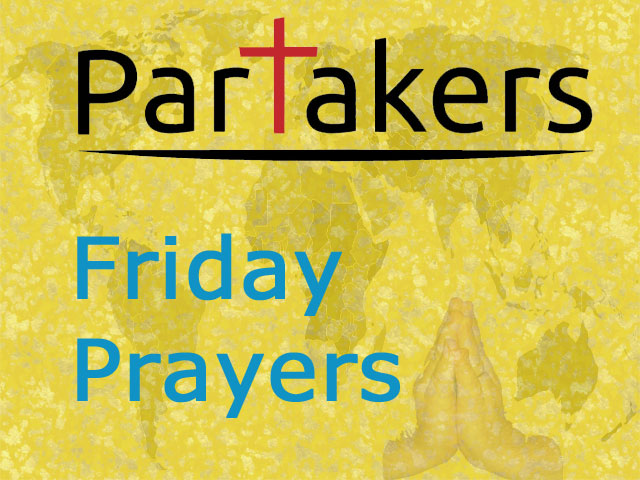
432.5K
Downloads
3362
Episodes
G’day and welcome to Partakers Christian Podcasts! Join us for uplifting Bible teaching, inspiring readings, heartfelt worship, powerful prayers, and fascinating church history. Whether you’re new to faith or growing deeper in your journey, we’re here to encourage and equip you. 🎧 Tune in, interact, and be inspired—wherever you are in the world.
G’day and welcome to Partakers Christian Podcasts! Join us for uplifting Bible teaching, inspiring readings, heartfelt worship, powerful prayers, and fascinating church history. Whether you’re new to faith or growing deeper in your journey, we’re here to encourage and equip you. 🎧 Tune in, interact, and be inspired—wherever you are in the world.
Episodes

Friday Sep 13, 2013
Friday Prayers
Friday Sep 13, 2013
Friday Sep 13, 2013

Partakers Friday Prayers!
13th September 2013!
We pray together and when Christians pray together, from different nations, different churches and different denominations - that reveals Church unity!
Today we are specifically praying for churches and church services this weekend! Come join in! Play & download the video!
Right mouse click to save this video as MP4 file.
Click on the appropriate link to subscribe to this website
Subscribe via iTunes

Sunday Sep 08, 2013
Sunday Worship
Sunday Sep 08, 2013
Sunday Sep 08, 2013
I Cannot Tell
William Y. Fullerton
I cannot tell why He whom angels worship,
Should set His love upon the sons of men,
Or why, as Shepherd, He should seek the wanderers,
To bring them back, they know not how or when.
But this I know, that He was born of Mary
When Bethlehem’s manger was His only home,
And that He lived at Nazareth and labored,
And so the Saviour, Saviour of the world is come.
~~~~~
I cannot tell how silently He suffered,
As with His peace He graced this place of tears,
Or how His heart upon the cross was broken,
The crown of pain to three and thirty years.
But this I know, He heals the brokenhearted,
And stays our sin, and calms our lurking fear,
And lifts the burden from the heavy laden,
For yet the Saviour, Saviour of the world is here.
~~~~~
I cannot tell how He will win the nations,
How He will claim His earthly heritage,
How satisfy the needs and aspirations
Of East and West, of sinner and of sage.
But this I know, all flesh shall see His glory,
And He shall reap the harvest He has sown,
And some glad day His sun shall shine in splendor
When He the Savior, Savior of the world is known.
~~~~~
I cannot tell how all the lands shall worship,
When, at His bidding, every storm is stilled,
Or who can say how great the jubilation
When all the hearts of men with love are filled.
But this I know, the skies will thrill with rapture,
And myriad, myriad human voices sing,
And earth to Heaven, and Heaven to earth, will answer:
At last the Saviour, Saviour of the world is King!
Play and/or download the video - Come and worship the King of all Kings!
Right Mouse click to save this as a video mp4 file ~

Sunday Sep 01, 2013
Sunday Worship
Sunday Sep 01, 2013
Sunday Sep 01, 2013
Joyful Joyful
performed by Dan Meredith
~
"Joyful, Joyful We Adore Thee" is a poem written by Henry van Dyke in 1907 with the intention of musically setting it to Beethoven's "Ode to Joy".
Joyful, joyful, we adore Thee,God of glory, Lord of love;
Hearts unfold like flowers before Thee, opening to the sun above.
Melt the clouds of sin and sadness; drive the dark of doubt away;
Giver of immortal gladness, fill us with the light of day!
Thou art giving and forgiving, ever blessing, ever blessed,
Wellspring of the joy of living, ocean depth of happy rest!
Thou our Father, Christ our Brother, all who live in love are Thine;
Teach us how to love each other, lift us to the joy divine.
(more...)
This version is by Dan Meredith and can be freely downloaded from his website
or at Godly Christian Music
Play and/or download the video - Come and worship the King of all Kings!
Right Mouse click to save this as a video mp4 file
~Click on the appropriate link below to subscribe or share

Sunday Aug 25, 2013
Sunday Worship
Sunday Aug 25, 2013
Sunday Aug 25, 2013
Be Thou My Vision
performed by Julie McMinn
~
This song, "Be Thou My Vision" is a traditional hymn from Ireland, which is commonly attributed to Dallán Forgaill.
Be Thou my Vision, O Lord of my heart;
Naught be all else to me, save that Thou art.
Thou my best Thought, by day or by night!
Waking or sleeping, Thy presence my light.
Play and/or download the video - Come and worship the King of all Kings!
Right Mouse click to save this as a video mp4 file
~Click on the appropriate link below to subscribe or share

Friday Aug 23, 2013
Friday Prayers
Friday Aug 23, 2013
Friday Aug 23, 2013

Partakers Friday Prayers!
23rd August 2013!
We pray together and when Christians pray together, including across the internet and from different times, different nations, different churches and different denominations - that reveals Church unity!
Today we pray once more, a Morning Prayer from the Syrian Clementine Liturgy. This Liturgy, dates from the 4th century, and was celebrated in Syria and throughout the Church of Antioch. It is the oldest model known in Antioch, and is a liturgy is related to the Apostle James. Come pray!
Syria at the moment is in turmoil. Let us pray for peace in this ancient land...
A Morning Prayer from the 4th Century Syrian Clementine Liturgy
O God,
You are the unsearchable abyss of peace,
the ineffable sea of love,
the fountain of blessings,
and the bestower of affection.
~~~~~
O God,
You who sends peace to those that receive it;
open to us this day the sea of Your love,
and water us with the plenteous streams
from the riches of Your grace.
~~~~~
Make us children of quietness, and heirs of peace.
Kindle in us the fire of Your love;
sow in us Your fear;
strengthen our weakness by Your power!
~~~~~
Bind us closely to You
and to each other
in one firm bond of unity;
for the sake of Jesus Christ.
Amen.
Right mouse click to save this as a MP3 file.
Click on the appropriate link below to subscribe or share

Sunday Aug 18, 2013
Sunday Worship
Sunday Aug 18, 2013
Sunday Aug 18, 2013
Testimony about
the role of Joy
in the life of a Christian
With Sue & Katy
~
Sue and Katy talk briefly about the role of God-given joy in their lives!
Shout with joy to God, all the earth!
Sing the glory of his name;
make his praise glorious!
Say to God, "How awesome are your deeds!
So great is your power that your enemies cringe before you.
All the earth bows down to you;
they sing praise to you,
they sing praise to your name."
Selah
~
Right Mouse click to save this as a video mp4 file
~Click on the appropriate link below to subscribe or share

Friday Aug 16, 2013
Friday Prayers
Friday Aug 16, 2013
Friday Aug 16, 2013

Partakers Friday Prayers!
16th August 2013!
We pray together and when Christians pray together, including across the internet and from different times, different nations, different churches and different denominations - that reveals Church unity!
you have given us grace at this time with one accord
to make our common supplication to you;
and you have promised through your well-beloved Son
that when two or three are gathered together in his Name
you will be in the midst of them:
Fulfil now, O Lord, our desires and petitions as may be best for us;
granting us in this world knowledge of your truth,
and in the age to come life everlasting.
In The Name of The Father , Son, and Holy Spirit!
Lord, deprive me not of Your heavenly and eternal blessings.
Lord, deliver me from everlasting torments.
Lord, if I have sinned in word or deed, in mind or spirit, forgive me.
Lord, deliver me from all distress, ignorance,
forgetfulness, laziness and stony hardness of heart.
Lord, deliver me from all temptations and spiritual abandonment.
Lord, enlighten my heart which has been darkened by evil desire.
Lord, being human, I sin; but You, being God, have mercy on me.
Lord, take heed of the weakness of my soul,
and help me with Your grace that Your holy name may be glorified in me.
Lord Jesus Christ, inscribe the name of Your servant in the book of life,
granting me a blessed end.
Lord my God,
I have done nothing good;
yet by Your compassion help me to make a new beginning.
Lord, refresh my heart with the dew of Your grace.
Lord, God of heaven and earth,
remember me, who am sinful, wretched, evil and impure, in Your kingdom, according to Your steadfast love.
Lord, receive me in repentance and do not forsake me.
Lord, put me not to the test.
Lord, grant me good thoughts.
Lord, grant me tears of repentance, remembrance of death and contrition.
Lord, grant me sincere confession of my thought.
Lord, grant me humility, deliverance from my own will and obedience.
Lord, grant me patience, forbearance and meekness.
Lord, implant in me Your holy fear, the source of all blessings.
Amen
Right mouse click to save this as a MP3 file.
Click on the appropriate link below to subscribe or share

Sunday Aug 11, 2013
Sunday Worship
Sunday Aug 11, 2013
Sunday Aug 11, 2013
I Have Decided To Follow Jesus
as sung by K
~
I have decided to follow Jesus;
I have decided to follow Jesus;
I have decided to follow Jesus;
No turning back, no turning back.
~
Tho' none go with me, I still will follow,
Tho' none go with me I still will follow,
Tho' none go with me, I still will follow;
No turning back, no turning back.
~
My cross I'll carry, till I see Jesus;
My cross I'll carry till I see Jesus,
My cross I'll carry till I see Jesus;
No turning back, No turning back.
~
The world behind me, the cross before me,
The world behind me, the cross before me;
The world behind me, the cross before me;
No turning back, no turning back.
~
Right Mouse click to save this as a video mp4 file
~Click on the appropriate link below to subscribe or share

Friday Aug 09, 2013
Friday Prayers
Friday Aug 09, 2013
Friday Aug 09, 2013

Partakers Friday Prayers!
9th August 2013!
We pray together and when Christians pray together, including across the internet and from different times, different nations, different churches and different denominations - that reveals Church unity!
We appeal to you, Lord! You are the God of Abraham, God of Isaac, God of Jacob and Israel, you the Father of your beloved Son, our Lord Jesus Christ.
Infinitely merciful as you are, it is your will that we should learn from you. O Father God, grant that we may know you more each day.
Heaven and earth were made with your hands, O God and you rule supreme over all that is. You are the true, the only God; there is no other god above you.
You alone are God; help each of us to draw strength from you and keep us on the paths of righteousness.
We ask this O Great God our Father,
through the name of your beloved Son Lord Jesus Christ our Saviour,
through the power of that greatest of gifts to those who are your children, the Holy Spirit.
Hear these words O God!
Amen.
Right mouse click to save this as a MP3 file.
Click on the appropriate link below to subscribe or share

Thursday Aug 01, 2013
Friday Prayers
Thursday Aug 01, 2013
Thursday Aug 01, 2013

Partakers Friday Prayers!
2nd August 2013!
We pray together and when Christians pray together, including across the internet and from different times, different nations, different churches and different denominations - that reveals Church unity!
An Ancient Prayer attributed to Peter and the other Apostles’
Holy you are, Lord God Almighty,
Father of our Lord Jesus Christ,
Delightful Garden,
Kingly Sceptre,
Lavish Love,
Hope assured and firm,
Counsel…
~
Holy you are, Lord God,
King of Kings and Lord of Lords.
You alone have immortality;
You live in light that none can approach
And no man has ever seen it;
You sit above the cherubim and thrones,
You ride on the wings of the winds;
You created the heavens, the land, the sea
And all that is in them…
~
You make the winds your messengers
And the fiery flame your servants;
You made man like yourself,
An image of yourself you made him;
You measured heaven with the span of your fingers
And the whole earth with the palm of your hand…
Fair indeed your works are to you!
~
Accept this prayer O Father
Through the name of your Son, My Saviour Jesus Christ,
In the power of the Holy Spirit who empowers me.
Amen!
Right mouse click to save this as a MP3 file.



